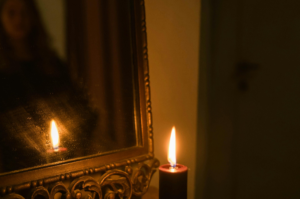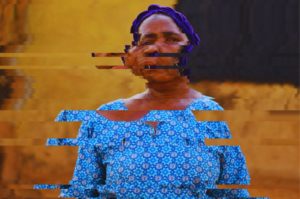
In the first life where you and I meet, I am a stowaway on your father’s boat. I hide away in the cargo holding, curled inside a box next to a barrel of Arab spices bound for Portugal. My body is lean as the brown panels of wood I lay on at night, and my skin is pulled taut across my bones like the drums I crafted with my father as a child. It’s been days since I last ate, and the water that I have brought along is merely drops away from an empty leather bag. Unknown to you, your voice soothes me to sleep each night, your humming and speaking, my only respite on this cursed boat. When you speak, there’s a softness to your words that is foreign to the cursing of the sailors and the harsh cries of seagulls that rest on the sails above.
When your father finds me, I throw myself at his feet, pleading for mercy. He narrows his eyes at my bronze skin and the sweat that glistens on my bare back and forehead. Instead of throwing me overboard, he offers me a cunning kindness: he will have me whipped and then set to work with the crew.
My body trembles with each stroke, fighting the fire of the whip with strength that it lacks. Your eyes find mine, and tears well in them for my pain. You blurt a cry for my release to your father’s surprise. But when he refuses, you throw yourself and your beautiful satin dress between me and your father. His whip, too late to be pulled back, tears into your arm, leaving an open wound that would become your only blemish. Your father is infuriated, but your defiance ends my suffering.
You and I begin to meet beneath the stars when most of the crew have gone to find sleep. We talk about your mother, whose face you barely remember. I tell you about my own family, my dusty village by the coast, and the reverend who taught me to speak in your complex language. On the fourth night of our meetings, you plant your lips on mine, and the stars seem to melt into the space between us.
It is days later when your father finds us, scantily clad, beneath the decks. He is furious again, and his brow furrows as he barks at the men to throw me overboard. I fight as they drag me away, kicking against them to reach you, but it’s to no avail. I soon feel my body volley across the hull and into the water.
The loud burst of the ocean opening up to receive my frail body muffles your screams, the chaos of it all charting my first soul’s sink into the darkness. From the water, the sky above is blurry and I wonder if in time, my face will be just as difficult to see in your memories.
***
In a second life, we cross paths at a train station in Old India. I have walked the branches of life to bring messages for the King in England to the administrators in Bombay. I have been spared no luxury because in yet another life, I speak many languages.
When you peer into the office adjacent to the station, your eyes find mine first. The stars from the sky above your last father’s boat now dance in them, and the room seems to shrink in size. I stutter, losing my fluency in all the languages I have spent years honing. Your mouth moves as you speak, and with my eyes on them, I crave to master your foreign tongue.
Politely, you announce that you’ve come looking for the station master, because you’ve heard he often comes here to drink with the men of the colonial office, but I stutter that he is yet to report. I ask for your name and you are hesitant to answer, your heavy bonnet and shiny pearl ring implying that somehow yet again, you are out of my reach, but instead of a father, you have a husband and children that are in tow behind you. Nevertheless, I offer to help you find whatever you need, and we walk out onto the road.
You return to the colonial office alone a week later to say thank you. When you stretch your hand to embrace me, I see the scar that your father inflicted during our brief meeting in our past life. I restrain myself from asking if you remember me, I can see in your eyes that the longing that has been in mine since I crawled out of my mother is instead born as curiosity in yours.
I stare into those eyes when we meet again and again, often at lunch on the banks of the Mithi river, where you tell me that you’ve seen me in many dreams before now, and I tell you it’s because you always wander around in mine.
When we leave India together on our journey to England, leaving behind your husband and children, a storm nearly claims our boat. Your body trembles next to mine, but I hold you close and promise you have nothing to fear in this life. The day our boat lands in England, we spend the evening seated by the Thames, and you ponder on whether Daisy is a name befitting for the child in your belly. I tell you that no matter what her name is, she will be beautiful and happy, just like you. When she is born in May of the following year, we appear to have found our peace; you and I and our daughter.
But in this second life, I lose you to fire. Giant flames that licked at the wood and bricks on a night I had fallen asleep at the local library. In all the mayhem surrounding it, I rush into the burning carcass of our home, trying to claw through the wreckage, but you and our daughter are lost to me already. I am pulled from the fire with searing burns on my arms that pulsate with red scarring.
I bury you next to Daisy on a plot by the Thames, and live fifty miserable years after that, fifty years too many.
***
In our present life, we meet at a dinner for friends in Lagos, your laughter ripples through the room, drawing me in when the echoes bounce back to you. I am seated next to you, and your fairy eyes seem to cast a spell on me, your scent of lavender and vanilla floats past me, prompting reveries of nights spent craving our meeting.
This time, you and I are more familiar, stepping into the rhythm of a dance that has spanned too many years. In my newer languages, I promise you the world and some if you would let me love you. In the ensuing weeks, I leave you handwritten love letters in English, Sanskrit, Yoruba, Kalabari and Portuguese, and your joy when you find them is boundless.
However, in this life, it is air that tries to take you. In a fashion much like you, you’ve gone on to help treat patients when an airborne virus plagues the world, without much regard for your own life. Little cotton masks pile up in our trash can, tokens of your relentless fight with invisible diseases at the hospital in Ikoyi. When the disease finally attacks your lungs and organs, it leaves you in the same bed as the patients you’ve fought hard to keep alive, plugged into a machine that beeps a song that must not end. The doctors call it a disease, but I know what this is.
The weavers of the threads of fate are stubborn and egotistical, and when you walk paths away from what they’ve designed, they will force your feet back in place. The memories of our past demises come to me in reveries, and I realize that it’s our crossing paths that often precedes the end of one of our lives. Like a drama, our plot is a short act to amuse the gods of reincarnation before they set us apart again. Like Fire and Water, one is extinguished at the meeting of our ever-wandering souls.
So, when I leave you, in hopes that our parting will cure you, I do it in grief and in love. I’ll be in Singapore by the time you wake up, in Shibuya by the time you get to read my letter; and I know my heart will ache from a distance when you read my promise to love you always, and search you out again in all the lives that will follow.
Photo by Vadim Butenkov on Unsplash, and Teddy tavan and José Manuel Ramírez Brenis on Pexels










COMMENTS -
Reader Interactions